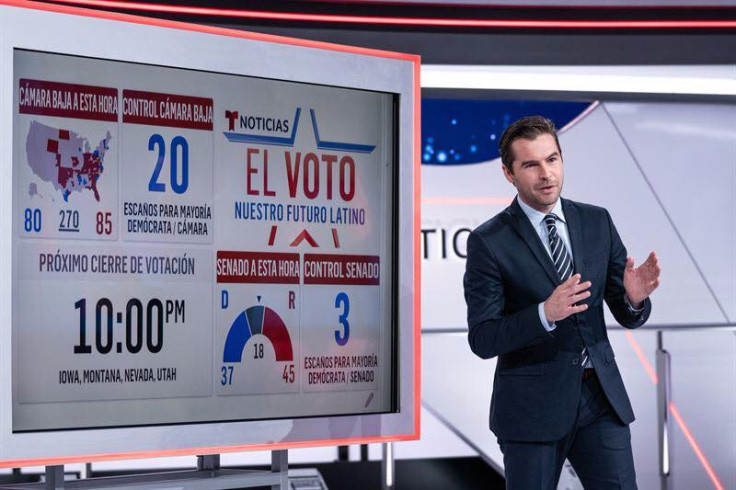
Approximately 36.2 million Latinos are projected to be eligible to vote this November, an increase from 32.2 million in 2020. Consequently, a burgeoning body of literature suggests that Latino and Hispanic voters could be pivotal in the forthcoming elections, especially in key battleground states such as Arizona, Georgia, and Pennsylvania.
As Latinos emerge as a powerful community in the eagerly anticipated contest, they also become prime targets for misinformation.
Since U.S. Latinos are not a monolithic group, disinformation and misinformation campaigns—many traceable to the candidates' own campaigns—frequently target various groups and nationalities with tailored messages that resonate with them.
"I live here in a community in Miami with many Venezuelans and many Cubans who are afraid of dictatorships and socialism. Some conspiracy groups know this and then they use it to scare people," Tomoa Calzadilla, editor-in-chief of Factchequeado, said.
For instance, a YouTube campaign ad that the Trump campaign created in 2020 falsely claimed that the Venezuelan government supported Joe Biden. According to nonprofit newsroom ProPublica, the video was watched more than 100,000 times in Florida in the nine days leading up to the 2020 presidential election. Truth is that Venezuelan president Nicolas Maduro didn't endorse any of the candidates, but some voters may have believed what they saw.

To combat this trend, Noticias Telemundo is ramping up its efforts to inform the Latino population ahead of November by reaching younger, more digitally savvy audiences with comprehensive election news, information and resources.
One of their initiatives, for example, T Verifica, offers Spanish-speaking WhatsApp users in the U.S. the opportunity to verify news and information in an easy and trustworthy manner.
To discuss these efforts, The Latin Times sat down with Julio Vaqueiro, the lead anchor of Telemundo's signature evening newscast "Noticias Telemundo." This interview has been edited for length and clarity.
The Latin Times: this year, there's been so much talk about Latinos, the presidential elections and misinformation, can you tell me a little bit more about what you think the current landscape is in regards to these issues?
Julio Vaqueiro: Latinos will play a pivotal role in this presidential election. We are the second largest voting bloc, for this 2024 presidential election, we're talking about 36.2 million eligible Latino voters, that's 4 million more voters than in 2020. And we live across the United States in in states that have big Electoral College numbers, and also in some very important swing states, that can really make a difference in the results in Nevada, Arizona, but also in states that we usually don't think of, when we talk about Latino Latino community like Pennsylvania or Georgia, the margins are going to be so close in this presidential election, that a few votes can really make a difference in those states. And those critical votes can be votes from Latino citizens. So I mean, I'm very excited to see what our role as a community will be. But I can predict that we will be a very important factor in the result.
"We are the second largest voting bloc, for this 2024 presidential election"
LT: Telemundo is launching several initiatives ahead of the November elections to target the Latino community. What role do you think Telemundo sees itself playing and increasing the Latino voter engagement as well as battling misinformation?
JV: We just want to offer fair and balanced, comprehensive coverage to be able to serve our community with unbiased information, reliable news; asking difficult questions to both sides. That's basically our goal.
Now, also, we are very focused on fighting misinformation, especially in this election year. So we have a couple of initiatives that we've put together to make sure we can do that. One of them is called T Verifica, which is our fact checking platform. And we're trying to produce more content for that platform. That means doing explainer stories or fact checking issues that are important for Latino voters.
Our digital team also has this initiative that I'm very proud about. It's a WhatsApp channel, where users and our audience can get in touch with journalists in the newsroom and ask them for a fact check or ask them if they have any questions about a specific story, and the team here is working very hard to be able to answer as many questions in fact, check as many issues as possible.
And we're also working with the Poynter Institute and with media wise with explainer videos on YouTube and online, where we try to explain people how to be able to find information that's not true, how to be able to see the red flags online and be able to notice what's true, what's not, and how to just think twice before sharing any piece of information they see online.
LT: Why do you think that Latinos are particularly susceptible to misinformation? Have you seen any sort of examples that stand out to you in regards to misinformation in Latinos?
JV: I think misinformation is something that journalists in general, whether you serve the Latino community or in an English speaking community, everybody in journalism should be fighting misinformation. That's our number one goal, is to be able to deliver the truth and find the truth, and then deliver the news according to what we find in our reporting. So that should be one of our main goals to fight misinformation.
But when we talk about the Latino community, I would say that we can be more vulnerable to it because we depend a lot on social media to be able to communicate with family members on the other side of the country, or in another country. So because of this we use a lot of WhatsApp or Facebook.
And then there's a lot of talk about misinformation in English. So the algorithms and the social media platforms have done a lot to fight misinformation in English. But when it comes to Spanish, the algorithm is not as effective at detecting what's true and what's not. So there's a lot of fake news out there and going around being shared in social media that's not detected by the platform and by the algorithms. So that's when we can come up and try and help people know when something's true. And when something's not true.
"We try to explain people how to be able to find information that's not true, how to be able to see the red flags online and be able to notice what's true, what's not"
LT: How does Telemundo make sure that their message and the true information is reaching wide audiences while also fighting the algorithm that you just mentioned?
JV: The way to fight misinformation is with more journalism, more and better journalism. Double check the facts, really go through the due diligence of making sure that you are doing the right work, so that you can serve your audience adequately. But we really want to meet our audience where they are. That's why we are so focused on our social media platforms. And honestly, the digital team has done a great job. We're the number one most watched Spanish language broadcast news account on YouTube, in Instagram and Facebook. On TikTok, actually regardless of language, we are the number two most viewed news account. So we're producing a lot of content and really trying to make sure that we reach those young Latinos where they are.
LT: How does Telemundo navigate covering sensitive issues like immigration, which is such a salient issue right now, but also affects your prime audience directly?
JV: We just want to deliver the facts. It's as simple as that. We just talk about the numbers and what the government is doing to solve the crisis at the border. We're talking about the many aspects around immigration, and also the human perspective of the people trying to cross the border, why they want to cross the border, how they are living in their home countries, what's going on through their way to Mexico to the border. So it's just trying to produce comprehensive coverage about the whole issue. And it's true that as Latinos, we care about immigration, it is not the main issue we care about. But we do care about immigration a lot, because we all have an immigration story. Or we all know somebody who migrated and brought their family here.
LT: some major news organizations often see Latinos as a monolithic group. How does Telemundo try to address this issue while reaching diverse perspectives and cultures among the Latino community?
JV: it's so important to be able to understand that Latinos are not a monolith. And we repeat this every election cycle. But it's a very diverse group. Different ages, different generations play an important role in how diverse we are, as a community, the countries where we come from, the states and the places in the United States where we live, all of that really plays an important factor in how we vote and what we care about. So a Latino in Florida will have different concerns from a Latino in California, or along the border, in Texas or in New York.. And, I mean, we are really conscious about that, because we are Latinos. So the way to really understand this diversity is to have diversity inside the newsroom. And to have journalists from different places that understand different contexts in the country, in Latin America, and make sure everybody brings their input to our editorial meetings, and to the stories we produce and the reporting we produce, so that we can put that on the screen every day on the newscast.
"We do care about immigration a lot, because we all have an immigration story. Or we all know somebody who migrated and brought their family here."
LT: Do you have any advice to journalists, or perhaps even Latino voters, in fighting misinformation?
JV: I would say that the number one thing to keep in mind, right now, with all this speed that information travels with, is just to stop and think twice before sharing any piece of news or any piece of information that gets to your phone or to your social media. Just think twice, read it twice and go through it and think about it and see if something might be true or not. Just be able to stop for a second and think about it before sharing it. And there's no rush. You know, sometimes we really care about being the first ones to report on something, but sometimes it's better not to be the first ones but to be accurate. So I would say that that would be very important advice on this election year.
© 2024 Latin Times. All rights reserved. Do not reproduce without permission.







